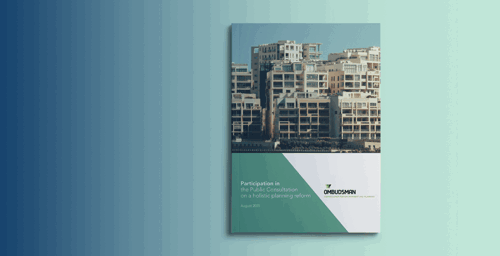
The Commissioner for Environment and Planning submits recommendations on planning reform
Published August 25, 2025
The Commissioner for Environment and Planning submits recommendations on planning reform
Published August 25, 2025

The Commissioner for Environment and Planning within the Office of the Ombudsman, Perit Alan Saliba, has submitted a comprehensive set of recommendations as part of the Government’s public consultation on a holistic planning reform.
The Commissioner welcomed the initiative but emphasised that reform must lead to a planning system that is transparent, accountable, enforceable, and fair to residents and third parties alike.
In his recommendations, the Commissioner highlighted a number of areas where changes are necessary:
- Appeals and permits – Development permits should be suspended while appeals are pending to avoid irreversible impacts. Appeal procedures must be fair, consistent, and accessible, with clear safeguards against unequal deadlines and unrealistic timeframes.
- Policy hierarchy – Planning decisions must follow Local Plans and Spatial Strategies, ensuring that public consultation and technical assessments carry proper weight. Departures from established plans should not be allowed arbitrarily.
- Enforcement and regularisation – Enforcement must be strengthened, particularly in Outside Development Zones. Regularisation against the payment of fines should not replace proper enforcement. Fines should be increased to reflect the seriousness of infringements, with revenue channelled into specific public projects.
- Validity of permits – The Building and Construction Authority should take over responsibility for construction timeframes and the validity of permits, reducing prolonged nuisance from stalled or extended projects. Different types of development should carry different validity periods.
- Public access and transparency – Greater access to information, clearer consultation procedures, and fairer appeal mechanisms are needed to ensure trust and accountability in the system.
Perit Saliba noted that reform should not only update procedures but also restore public trust by curbing the normalisation of irregular development, ensuring that planning decisions respect both the environment and community well-being.
Consultation Participation
Please Wait
Processing
Operation Completed